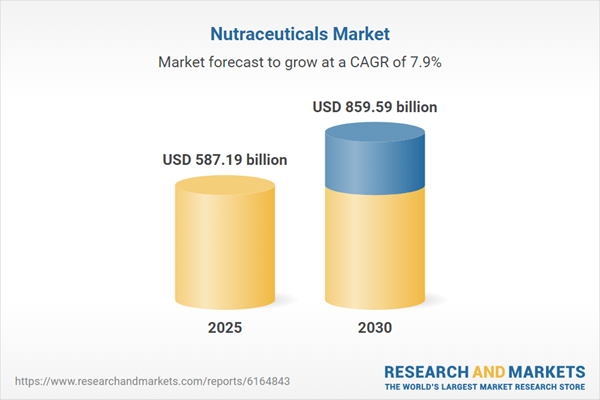Nutraceuticals, a fusion of nutrition and pharmaceuticals, are gaining traction for their dual role in providing nutritional benefits and addressing health issues, including disease prevention and treatment. Available as functional foods, beverages, and herbal products such as ginger, garlic, onion, and turmeric, nutraceuticals are redefining dietary supplements and food ingredients. The global nutraceuticals market is driven by increasing health consciousness and a rising aging population, though challenges like high costs and limited product awareness may impede growth.
Market Drivers
The nutraceuticals market is propelled by growing health concerns worldwide, particularly as consumers prioritize preventive healthcare and wellness. The increasing prevalence of chronic diseases, such as diabetes, cardiovascular conditions, and obesity, fuels demand for nutraceuticals that offer therapeutic benefits alongside nutrition. An aging global population further accelerates market growth, as older demographics seek products to support vitality and manage age-related health issues. The versatility of nutraceuticals, available in forms like functional foods and herbal supplements, aligns with consumer preferences for natural and health-promoting solutions, driving market expansion.Market Restraints
Despite its growth potential, the nutraceuticals market faces significant challenges. High production and development costs can make these products less accessible, particularly in price-sensitive markets, limiting adoption. Additionally, a lack of widespread product awareness hinders market penetration, as consumers and even some healthcare professionals may not fully understand the benefits or applications of nutraceuticals. Overcoming these barriers through cost-effective innovations and targeted education campaigns will be essential for sustained market growth.Market Segmentation
By Product Type
Nutraceuticals encompass a wide range of products, including functional foods, beverages, and herbal supplements. Functional foods and beverages, such as fortified dairy or energy drinks, dominate due to their integration into daily diets. Herbal products like turmeric and ginger are gaining popularity for their natural health benefits, appealing to consumers seeking plant-based solutions. Dietary supplements, reformulated as nutraceuticals, also contribute significantly to the market, offering targeted health support.By Geography
The nutraceuticals market is witnessing strong growth globally, with notable demand in regions with high health awareness and aging populations. North America and Europe lead due to established healthcare infrastructures and consumer willingness to invest in wellness products. The Asia-Pacific region is emerging as a key growth area, driven by rising disposable incomes, increasing chronic disease prevalence, and growing acceptance of herbal and natural products in countries like India and China.Key Industry Players
Major players in the nutraceuticals market include Abbott Laboratories, AOR, Ajinomoto Health & Nutrition North America, Inc., Archer Daniels Midland Company, Cargill, Danone's.A., Mead Johnson & Company, LLC, Nestlé, Nordic Naturals, and Omega Protein Corporation. These companies are focusing on product innovation and portfolio expansion to meet evolving consumer demands and regulatory standards.The nutraceuticals market is poised for growth, driven by rising health concerns, an aging population, and the increasing incidence of chronic diseases. While high costs and limited awareness pose challenges, the market's outlook remains positive, particularly in regions with strong health-conscious consumer bases. Industry players must prioritize affordability and education to unlock the full potential of nutraceuticals in promoting global health and wellness.
Key Benefits of this Report:
- Insightful Analysis: Gain detailed market insights covering major as well as emerging geographical regions, focusing on customer segments, government policies and socio-economic factors, consumer preferences, industry verticals, and other sub-segments.
- Competitive Landscape: Understand the strategic maneuvers employed by key players globally to understand possible market penetration with the correct strategy.
- Market Drivers & Future Trends: Explore the dynamic factors and pivotal market trends and how they will shape future market developments.
- Actionable Recommendations: Utilize the insights to exercise strategic decisions to uncover new business streams and revenues in a dynamic environment.
- Caters to a Wide Audience: Beneficial and cost-effective for startups, research institutions, consultants, SMEs, and large enterprises.
What do businesses use our reports for?
Industry and Market Insights, Opportunity Assessment, Product Demand Forecasting, Market Entry Strategy, Geographical Expansion, Capital Investment Decisions, Regulatory Framework & Implications, New Product Development, Competitive Intelligence.Report Coverage:
- Historical data from 2020 to 2024 & forecast data from 2025 to 2030
- Growth Opportunities, Challenges, Supply Chain Outlook, Regulatory Framework, and Trend Analysis
- Competitive Positioning, Strategies, and Market Share Analysis
- Revenue Growth and Forecast Assessment of segments and regions including countries
- Company Profiling: Strategies, Products, Financial Information, and Key Developments among others
Nutraceuticals Market Segmentation:
The Nutraceuticals market has been analyzed through the following segments:By Type
- Functional Foods
- Functional Beverages
- Dietary supplements
- Herbal and Natural Products
By Form
- Capsules & Tablets
- Powders
- Gummies & Chewables
- Liquids
- Softgels
- Bars & Snacks
By Distribution Channel
- Online
- Offline
By End-User
- Adults
- Geriatric Population
- Children
- Pregnant Women
- Athletes
By Geography
- North America
- USA
- Canada
- Mexico
- South America
- Brazil
- Argentina
- Others
- Europe
- United Kingdom
- Germany
- France
- Spain
- Others
- Middle East and Africa
- Saudi Arabia
- UAE
- Others
- Asia Pacific
- China
- Japan
- South Korea
- India
- Indonesia
- Thailand
- Others
Table of Contents
Companies Mentioned
- Abbott Laboratories
- AOR
- Ajinomoto Health & Nutrition North America, Inc.
- Archer Daniels Midland Company
- Cargill, Incorporated
- Danone S.A.
- Mead Johnson & Company, LLC.
- Nestlé
- Nordic Naturals
- Omega Protein Corporation
- DSM-Firmenich (Koninklijke DSM N.V.)
- International Flavors & Fragrances Inc. (IFF)
- GlaxoSmithKline plc.
- Bayer AG
Table Information
| Report Attribute | Details |
|---|---|
| No. of Pages | 144 |
| Published | August 2025 |
| Forecast Period | 2025 - 2030 |
| Estimated Market Value ( USD | $ 587.19 billion |
| Forecasted Market Value ( USD | $ 859.59 billion |
| Compound Annual Growth Rate | 7.9% |
| Regions Covered | Global |
| No. of Companies Mentioned | 14 |









